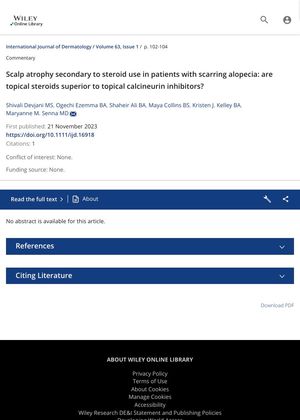TLDR Topical calcineurin inhibitors might be safer than steroids for scarring alopecia, but more research is needed.
The commentary discusses the issue of scalp atrophy in patients with scarring alopecia due to steroid use and evaluates whether topical steroids are superior to topical calcineurin inhibitors. The authors highlight that while topical steroids are commonly used for treating scarring alopecia, they can lead to scalp atrophy. The paper suggests that topical calcineurin inhibitors might be a better alternative due to their lower risk of causing atrophy. However, the commentary does not provide a definitive conclusion, indicating the need for further research to compare the long-term efficacy and safety of these treatments.
 79 citations
,
September 2018 in “Dermatologic therapy”
79 citations
,
September 2018 in “Dermatologic therapy” Oral tofacitinib can significantly improve recalcitrant lichen planopilaris.
11 citations
,
January 2017 in “Skin Appendage Disorders” Use lower concentrations of triamcinolone acetonide to reduce steroid-induced scalp atrophy.
 48 citations
,
May 2013 in “Canadian Medical Association Journal”
48 citations
,
May 2013 in “Canadian Medical Association Journal” Primary cicatricial alopecia, a rare disorder causing permanent hair loss, is hard to diagnose and treat, with treatments like anti-inflammatory drugs and steroids offering varied results and no guaranteed cure. Psychological support for patients is important, and future research should aim to identify causes of the condition.
 16 citations
,
January 2015 in “Current problems in dermatology”
16 citations
,
January 2015 in “Current problems in dermatology” Alopecia Areata is an autoimmune hair loss condition that needs more research for better treatments.

Antimalarial agents are effective for LPP, and intralesional steroids are effective for FFA.

Topical treatments like minoxidil and corticosteroids are effective for hair loss, with JAK inhibitors promising for alopecia areata.
 November 2024 in “Deleted Journal”
November 2024 in “Deleted Journal” Platelet-rich plasma injections can help treat hair loss in lupus patients.
 July 2018 in “Elsevier eBooks”
July 2018 in “Elsevier eBooks” Lichen Planopilaris is a hair loss condition best treated early with various medications, including hydroxychloroquine, to prevent permanent baldness.







